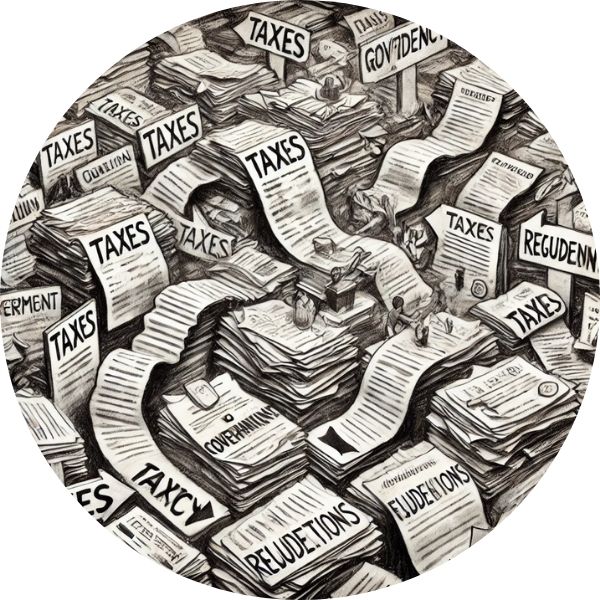Think You’ll Still Move Your Crypto Freely in 2025? Think Again.
If you believe you’ll still be able to move your crypto around like nothing happened in 2025, let me bring you back to reality. Governments have found their new public enemy number one: you. Not because they care about what you do with your money, but because every bitcoin that slips out of their control is a tax they can’t collect, a transaction they can’t track, a financial system they don’t own.
So, they’ve decided to tighten the screws. Regulations like MiCA in Europe, DAC 8, the Travel Rule, and other bureaucratic nightmares are turning banks into official government informants.
- Used crypto? The tax office will know.
- Transferred money to your bank account? Reported.
- Made a transaction over €1,000? May God have mercy on you.
Not all countries are playing the same game, though. While some are turning into financial prisons disguised as democracies, others have realized that crypto adoption is not a threat—it’s an opportunity.
And that’s where this article comes in.
Let’s talk about crypto-friendly countries in 2025. Places where:
✔ The rules are clear and don’t change every time a politician needs funding for their next pet project.
✔ Banks don’t shut down your account for buying USDT.
✔ The government doesn’t treat you like a criminal just because you want to bank your assets.
✔ Taxes are reasonable—or even better, nonexistent—for crypto investors.
Because for many, banking crypto is not a luxury, it’s a necessity. You can HODL all you want, but sooner or later, you’ll need liquidity. And when that moment comes, you’d better have chosen the right place to operate.
So, if you still want to believe that “nothing will happen in my country,” go ahead. But if you’d rather stay ahead of the game and protect your money before it’s too late, keep reading. This could save you from a lot of trouble (and a lot of money).
Indice del artículo
Criteria for Choosing Crypto-Friendly Countries in 2025: Don’t Fall Into the Trap
Before you rush to open an account in the first country someone on Twitter calls “crypto-friendly,” let me tell you something: not everything that glitters is gold, and not everything that seems safe actually is. Some countries sell themselves as financial havens, but when you take a closer look, they turn out to be a trap for your crypto.
So before we start talking about destinations, let’s get one thing straight: what makes a country truly crypto-friendly? It’s not just about “not charging taxes” or “having banks open to crypto.” If you choose wrong, it could cost you dearly.

Regulation and Government Policies: Do They Play Fair or Change the Rules When It Suits Them?
This is where people often get confused. Some believe that a country without crypto regulations is dangerous, while others think that strict regulations make a country safer. Both can be wrong.
What truly matters is how a country treats cryptocurrencies in practice. It’s one thing for a government to establish a clear and flexible legal framework, like Switzerland or the UAE, and another for a country to simply stay out of the way and let crypto operate freely, like Panama or Paraguay. Both can be great choices, depending on what you’re looking for.
Countries with Clear Regulation
These are places where the rules are written, followed, and don’t change overnight. No last-minute surprises, no retroactive laws that complicate your life.
✔ Example: UAE – Well-defined regulation, official crypto licenses, recognized exchanges, and a banking system adapted to digital assets.
Countries with Territorial Taxation and No Crypto Regulation
These countries don’t see crypto as something that needs special regulation—and that plays in favor of investors. If income is not generated within the country, it is not taxed.
✔ Example: Panama and Paraguay – Here, you can operate freely without government interference or unnecessary scrutiny.
What You Should Avoid: Regulatory Traps
Some countries lure in crypto investors with tax benefits, only to slam them later with new taxes, restrictions, and absurd controls. These places are a regulatory minefield waiting to explode.
Banking Infrastructure: If a Bank Treats You Like a Criminal, It’s Not the Right Country
It doesn’t matter if a country has clear regulations if banks are still stuck in the 20th century. One thing is being legally allowed to hold cryptocurrencies; another is having banks that actually let you operate without freezing your account at the first mention of “Bitcoin.”
A crypto-friendly country has banks and fintechs that understand how the industry works. They allow deposits, withdrawals, and transactions without treating you like a money launderer.
Taxation: Paying Taxes? Fine. Being Robbed? No.
This is where many people lose money without realizing it. There are countries with low or zero crypto taxes, and then there are those that bleed you dry with every transaction.
And the worst part? Some governments are starting to tax unrealized gains. Yes, you read that right: they want to tax profits that you haven’t even cashed out.
✔ Example of a bad country: Germany – Once considered a crypto haven with its one-year tax exemption rule (if you hold crypto for over 12 months, you don’t pay taxes). But now, European regulations and increasing fiscal pressure make holding crypto in Germany a gamble that could turn against you.
Economic and Political Stability: Because You Don’t Want Your Money in a Country That Collapses Tomorrow
If you’re moving your capital to another country, you better make sure it’s not on the verge of economic collapse. Because no matter how good a country looks on paper, if its economy or government is unstable, your money is at risk.

Best Countries to Bank Cryptocurrencies in 2025: Where to Put Your Money Without Being Taxed to Death
We’ve already covered what makes a country truly crypto-friendly and debunked the myth that any place without regulation is automatically a tax haven. Now, let’s get to the real question: which destinations are actually worth considering?
So let’s not waste time. Where can you bank your crypto without getting wrecked?
El Salvador: Bitcoin as Legal Tender & Banks That Get It
If there’s one country that deserves to be on this list, it’s El Salvador. It’s the only nation in the world where Bitcoin is legal tender, meaning you can pay for everything from coffee to real estate in BTC without anyone batting an eye.
Why is El Salvador a solid option?
✔ Bitcoin as official currency – No need to justify every crypto transaction like in other countries. BTC is money, period.
✔ Banks open to crypto – Not all banks are fully crypto-friendly yet, but the financial system is evolving fast. More banks are integrating Bitcoin without complications.
✔ Zero taxes for foreigners – If you’re not a tax resident, you don’t pay capital gains taxes on crypto. Simple as that.
The challenge?
While El Salvador is crypto-friendly, its banking system is still adapting. Some traditional banks still impose restrictions, although the trend is positive.
Panama: Territorial Taxation & Financial Flexibility
Panama hasn’t declared Bitcoin as legal tender, but it has done something equally powerful: it doesn’t interfere with those who operate in crypto.
Why is Panama attractive?
✔ Territorial taxation – What you earn outside of Panama is not taxed. This means if you trade on international exchanges or move crypto from abroad, you’re left alone.
✔ Easy business incorporation – If you need to bank your crypto through a company, you can set one up quickly and with minimal bureaucracy.
✔ Banks are becoming more crypto-friendly – While traditional Panamanian banks have been cautious, more institutions are now accepting crypto transactions, especially for businesses.
The challenge?
Not all banks in Panama are fully on board with crypto yet, so choosing the right bank is crucial.
United Arab Emirates: The Crypto Paradise for Traders & Businesses
If you’re looking for a country where crypto is seen as an opportunity rather than a threat, Dubai and Abu Dhabi should be on your radar.
Why is the UAE a top choice?
✔ Clear & advanced regulation – No legal uncertainties. You know exactly how to operate without fear of sudden regulatory changes.
✔ Crypto-friendly banks – More and more banks and fintechs are integrating crypto solutions. Opening an account is possible and far less bureaucratic than in other places.
✔ Zero capital gains tax – If you trade crypto and are not a tax resident elsewhere, you pay no taxes in the UAE.
The challenge?
The cost of living is high, especially if you plan to establish residency. To take full advantage of the tax benefits, you’ll need to prove financial solvency.

Switzerland: Europe’s Crypto Valley
When we talk about Switzerland, we talk about trust, security, and banking tradition. If you need access to private banking that understands crypto, Zug—also known as Crypto Valley—is your best bet.
Why is Switzerland attractive?
✔ Clear regulation – Switzerland was one of the first countries to establish a clear legal framework for crypto. The rules don’t change overnight.
✔ Crypto-friendly banks – Switzerland has one of the best integrations between traditional banking and digital assets.
✔ Privacy & stability – If you’re looking for a safe place for your money, Switzerland remains one of the most reliable destinations.
The challenge?
Accessing Swiss private banking isn’t for everyone. It requires a minimum capital threshold and a strong financial track record.
Paraguay: Tax Freedom & Cheap Energy for Miners
Paraguay may not be the first country that comes to mind when talking about crypto, but there’s an opportunity here that few are seeing.
Why is Paraguay interesting?
✔ Territorial taxation – If your crypto income comes from outside the country, you pay zero taxes. Simple as that.
✔ Flexible regulation – While there’s no specific crypto law, this allows freedom to operate without excessive regulations or absurd controls.
✔ Low costs – Both the cost of living and residency requirements are far more affordable than in other destinations.
The challenge?
Banking infrastructure is still developing. If you need ultra crypto-friendly banks, Paraguay still has room for improvement.
Countries to Avoid for Banking Crypto in 2025: Traps Disguised as Havens
Not everything that shines is gold, and if the crypto world has taught us anything, it’s that what seems like a haven today can turn into a golden cage tomorrow.
There are countries that look great on paper—“low taxes,” “crypto-friendly banks,” “flexible regulatory framework”… but once you dig deeper, the reality is very different.
Let’s go through the blacklist of countries you should avoid if you truly want to bank your crypto in 2025 without risking your money, time, or sanity.

Portugal & Germany: Trapped in the EU’s Regulatory Web
Portugal and Germany were once crypto havens in Europe. Portugal offered long-term tax exemptions for crypto, and Germany had its famous “one-year rule”, making them seem like safe choices. But the EU had other plans.
The problem is no longer just taxation—it’s regulation. Europe has activated full surveillance mode. With laws like MiCA, DAC 8, and the Travel Rule, banks and exchanges are now required to report all your transactions. Say goodbye to privacy.
✖ Portugal: While it still doesn’t tax long-term holders, banks have tightened their stance, and EU regulations now force them to report every crypto transaction.
✖ Germany: With DAC 8 fully in motion, all transactions will be monitored. On top of that, the infamous “Exit Tax” threatens to tax your crypto even if you move abroad.
🔴 Verdict: Portugal and Germany are no longer crypto-friendly havens. If you want to operate without constant surveillance, you’d better look elsewhere.
Singapore: A Paradise for the Rich, a Nightmare for Everyone Else
Singapore still doesn’t tax crypto gains, but try opening a bank account without being a millionaire—good luck.
✖ Closed banking system for foreigners without massive capital – If you’re not bringing six figures, forget about it.
✖ Unreachable residency requirements – This is not a destination for the average investor.
✖ Absurd cost of living – Between rent and bureaucracy, it’s more expensive than just paying taxes elsewhere.
🔴 Verdict: If you’re not a whale, Singapore doesn’t want you there.
Thailand, Indonesia & Malaysia: Low Taxes, But Endless Bureaucratic Barriers
These countries seem like attractive options, but if you don’t meet their ridiculous residency requirements, you’re not getting in.
✖ Endless paperwork to obtain a visa – Without high income or a business, you won’t qualify.
✖ Conservative banking system – Most banks still view crypto with suspicion.
✖ Lack of stability – What’s legal today might not be tomorrow.
🔴 Verdict: Great weather, terrible choice for banking crypto.
France & Denmark: Taxing Unrealized Gains? Yes, Seriously.
These countries aren’t playing games—they want to tax you even if you haven’t sold your crypto yet.
✖ Ultra-aggressive tax policies – If there’s a way to tax you, they’ll find it.
✖ Regulation that kills financial privacy – Your financial history belongs to the government.
✖ Constantly changing laws – Today it’s a new tax, tomorrow it’ll be something worse.
🔴 Verdict: If you don’t want to pay taxes on money you haven’t even earned yet, run from here.

Final Considerations: Plan Wisely or Pay the Price
If one thing is clear, it’s that banking cryptocurrencies in 2025 is no game. The world is now divided between countries that see crypto as an opportunity and those that view it as a threat. Choosing the wrong one could cost you money, time, and even access to your funds.
That’s why strategic planning is key. It’s not enough to pick a country that sounds good on social media—you need to evaluate regulation, taxation, banking infrastructure, and political stability.
This is where professional guidance becomes essential. What works for a trader is not the same as what works for a holder, and what seems like a great option today might not be tomorrow. Having a clear strategy saves you from headaches and gives you full control over your money.
📌 Steps to Properly Bank Your Crypto Assets:
1️⃣ Define your strategy – Are you operating as an individual, a company, or an investment fund?
2️⃣ Choose the right country – Based on regulations, taxes, and banking accessibility.
3️⃣ Open accounts and establish residency if needed – To ensure stability in your operations.
4️⃣ Monitor legal changes – Because nothing in the crypto world is static.
2025 will be the year many regret not planning ahead. Don’t be one of them. Banking your crypto is a crucial decision, and doing it right today will save you from serious trouble (and financial losses) tomorrow.



